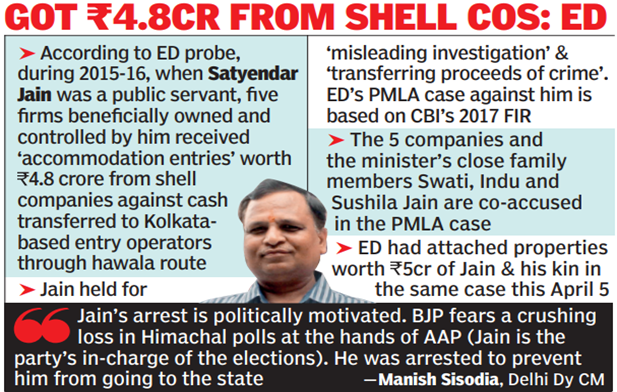In News: The Delhi Health Minister was recently arrested by the Enforcement Directorate (ED) for allegedly misleading investigations and transferring proceeds of crime, which is a serious offence under the Prevention of Money Laundering Act (PMLA).
What’s in today’s article:
- The PMLA, 2002 (About, salient provisions)
- Provisions regarding arrest of sitting MPs/MLAs/Ministers
- News Summary
The Prevention of Money Laundering Act (PMLA), 2002:
- About:
- It is an Act of the Parliament of India enacted to prevent money-laundering and to provide for confiscation of property derived from money-laundering.
- The Act and Rules notified (both came into force with effect from 2005) there under impose obligation on banking companies, financial institutions and intermediaries to verify identity of clients, maintain records and furnish information in prescribed form to Financial Intelligence Unit - India (FIU-IND).
- Salient provisions:
- Key definitions:
- Attachment: Prohibition of transfer, conversion, disposition or movement of property by an appropriate legal order.
- Proceeds of crime: Any property derived or obtained, directly or indirectly, by any person as a result of criminal activity relating to a scheduled offence.
- Money-laundering: Whoever, directly or indirectly, attempts to indulge or assist another person, or who is actually involved in any activity involving criminal proceeds and portraying it as untainted property.
- Payment system: A system that enables payment to be effected between a payer and a beneficiary. It includes the systems enabling credit card, debit card, smart card, money transfer or similar operations.
- Punishment for money-laundering:
- The Act prescribes that any person found guilty of money-laundering shall be punishable with rigorous imprisonment from 3-7 years.
- Where the proceeds of crime involved relate to any offence under the Offences under the Narcotic Drugs and Psychotropic Substance Act, 1985, the maximum punishment may extend to 10 years.
- Adjudicating authority:
- The Adjudicating Authority is the authority appointed by the central government through notification to exercise jurisdiction, powers and authority conferred under PMLA.
- It decides whether any of the property attached or seized is involved in money laundering.
- It shall not be bound by the procedure laid down by the Code of Civil Procedure,1908, but shall be guided by the principles of natural justice and subject to the other provisions of PMLA.
- Appellate tribunal:
- It is the body appointed by the Government of India and given the power to hear appeals against the orders of the Adjudicating Authority and any other authority under the Act.
- Orders of the tribunal can be appealed in the appropriate High Court (for that jurisdiction) and finally to the Supreme Court (SC) of India.
- Financial Intelligence Unit – India (FIU-IND):
- It was set by the Government of India in 2004 as the central national agency responsible for receiving, processing, analysing and disseminating information relating to suspect financial transactions.
- FIU-IND is also responsible for coordinating and strengthening efforts of national and international intelligence, investigation and enforcement agencies in pursuing the global efforts against money laundering and related crimes.
- FIU-IND is an independent body reporting directly to the Economic Intelligence Council (EIC) headed by the Finance Minister.
Provisions regarding arrest of sitting MPs/MLAs/Ministers:
- According to the Code of Civil Procedure 1908 (Section 135A), the Union ministers and members of Parliament (MPs) enjoy immunity from arrest in the case of civil matters and cannot be arrested 40 days before, during, or 40 days after a Parliament session.
- However, there is nothing in the rule book that prevents a minister's arrest in a criminal matter.
- The presiding officer of the House (of which the arrested person is a member) must be informed upon his arrest. This information is then notified in the Parliament bulletin if the House is not in session, or informed to the House, if it is in session.
- The only exception to the rule is when a member or minister has to be arrested from the premises of Parliament, the permission of the chair must be sought.
- Under the Indian Constitution (Article 361), immunity from arrest in both civil and criminal matters extend only to the President and governors, who cannot be arrested even in criminal matters while they are in office.
- Any action, even in criminal matters, may only be initiated after they demit office.
News Summary:










